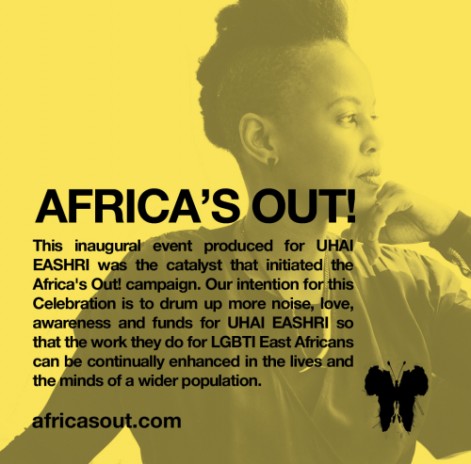#CountMeOUT: Wangechi Mutu & Toshi Reagon
“I am not free while any woman is unfree, even when her shackles are very different from my own.” -Audre Lorde
theHotness celebrates and partners with Black queer women this month in our #CountMeOUT campaign that links African and African-American women– both queer and straight in conversations and hopefully in a movement that expands the ways in which we think about community, activism and sisterhood.
In launching #CountMeOUT, I will present a series of brief, curated conversations called OUT Takes between myself and two other women (one African and one American or Caribbean). In these OUT Takes we discuss the experiences of Black women who identify as LGBTQI in Africa (Kenya, Ghana, Nigeria and South Africa in particular) and in America. Looking at art, music and film as vehicles for change and transformation (of others and of oneself), and looking at new, revised definitions of pan-Africanism, we discuss how our work can create new ways of thinking about trans-continental sisterhood, activism, and community, and contemplate, if not revise the notion of THEIR struggle.
I am thrilled that I am able to launch #CountMeOUT this week in support of artist Wangechi Mutu’s groundbreaking platform Africa’s Out! that launches it’s inaugural event tonight at Gladstone Gallery with a spectacular art auction featuring Kehinde Wiley, and an unbelievable line-up of Hot Grrrl artists including Lorna Simpson, Mickalene Thomas, Renee Cox, Toyin Odutola, to name just a few. The night will feature dishes fused and inspired by popular African fare and the highlight of the night will be a performance by Solange Knowles. Boom!
In this first OUT Take I speak with Wangechi and singer, composer, musician producer Toshi Reagon who is the founder of WORD*ROCK*&SWORD: A Festival Exploration of Women’s Lives, and the leader of her own ensemble, Toshi Reagon and Big Lovely. As we circled in and out of topics ranging from artivism, colonialism, and straight and queer grrrl coalitions, these women offered powerful insights into how to get free and most importantly, how we can stay free– across oceans and across our differences. This talk actually went three times longer than planned so this is just Part 1. Stay tuned for the best of the rest. – Nicole Moore
Me: So often when I talk about my passion to advocate for Queer Pride and the rights of Black gay and trans women or even how deeply I was moved by films like Paris Is Burning or more recently, Out In The Night or even that Audre Lorde is my favorite writer, I get in response from men and women—queer and straight, “Wait, are you gay?” Even in the minds of my most intellectual and liberal of friends there seems to be this implicit thought that being an activist for my LGBTQI sistren or the fact that I can relate to Zami in a deep way there is no way I can be straight. I find this reasoning interesting if not disturbing because it signals, even in 2015, subliminally, a serious disconnect with Black sexuality, pleasure and community. So I’m sure Wangechi, folks want to know how a straight, married woman with two children would find the inspiration to create a platform like Africa’s Out! Can you please share with us how you were inspired to take on this initiative?
Wangechi: I’ve been thinking about the female body for years. It’s the thing I’ve been put on this earth to do—to push the African woman’s body into the center of our conversations. It all starts from my work. I think about my own position and the people who have impacted me the most, and often seem to be the least visible—my mother, my grandmother. And then that same type of empathy has trickled into other places, which has made me understand there’s no division between oppression. It’s all related. When Black women are being treated a particular way it’s because gay people are being treated the same way. It’s the climate and how we view one another.
Africa’s Out! has always been on my mind. Black people are going to have to heal and empower and build their own spaces themselves. It’s not going to come from the outside. We are never going to get apologies for colonization. We’re never going to get the reparations we deserve. We’re never going to get an explanation for the cruelty that was dealt upon us for all of those years. So we have to decide to self-heal, which is very difficult. But you have to say, “This happened and I’m still here. I am a witness to this legacy of this madness. But I’m alive.” So I’m going to make testament to my livelihood by doing something beautiful and creative and crazy and bold and sexy and interesting and magnificent because that’s what they didn’t want us to do. We were supposed to disappear somehow into the system. My artistic-ness is my biggest outing. I had to leave my family, my country and my continent and say that I’m an artist. There was no support. No explanation for how I could make it. So I identify with this notion of how to live in these little corners and having to pretend that you are not quite who you are because people will inevitably tell you to become something normal. I identify with the queer community because art spaces, generally speaking, are queer identified because were always thinking outside of the box because we’re always being pushed outside the box. I identify with that notion because I had to live outside of myself to survive– to survive the patriarchy and restrictions (of the art world). I have no problem identifying with anybody who is interested in making something gorgeous and powerful and who chooses to speak for humanity and our own humanity.
The UHAI EASHRI organization was brought to me by its director, Wanja Muguongo through a conversation we had. It was a gift that was given to me. A match that has lit this beautiful fire that we’re going to gather around. It’s the switch that turns on the disco ball that we’re going to party underneath. I am thrilled to be starting off this Africa’s Out! campaign for LGBTQI rights for Black folks. And I am not leaving anyone behind in my conversations. African countries have a hard time with the conversation of homosexuality and gay people being African. People have gone out of their way to say this it’s not African and that’s bullshit! There is nothing un-African about it. I think I find a lot of times when we talk about Africa we want to talk about the really negative things or we want to romanticize it. My thing is let’s be real. Let’s look at who it is we are and let’s take everyone together into the next stage of evolution. And that’s where I want to live. I want to live in a place where brilliant, charismatic, interesting people have something to say in a beautiful way. Where we’re not out to hide one another or hide our issues. That’s why there’s a butterfly to represent Africa’s Out! It represents evolution. And I’m starting with a fundraiser for UHAI EASHRI because that’s always an issue. No one wants to give money to gay issues in Kenya. It’s not a priority at all.
Toshi: I think it’s just obvious that whenever there’s a system of oppression that there are many different ways people use these issues to drive imbalance, violence, and torture and that’s to keep the very few people in power and this severe system of oppression powerful. I think we’ve seen here in the US the creation of this anti-gay, anti-queer movement and who it benefitted and who it helped destroy. For human beings in the world and especially Africa, but anywhere that are suffering under these systems of brutality, these systems are there to let people know what it is about them that isn’t right so that they don’t have to address the real issues of injustice. It makes it harder for people to come together. There’s always something you can’t change. You can’t change who you are if you’re queer. So it’s a great tool to destroy communities. Everybody, I don’t care what you do, has to get on board with Africa as a continent. I am Africa around these rights. You know, I don’t care who anyone sleeps with so we need to come together around these issues. They are human issues and they are about balancing the world and getting rid of these systems that we have all become addicted to, but that are very destructive. I think art is the way to freedom and salvation. I’m glad that Africa’s Out! exists. I think it’s a very, very powerful tool to bring light to this for all people. And I think it’s great Nicole that you’re having these conversations.
Me: Thanks Toshi.
To Be Continued…
Meanwhile if you want to show your love and make a contribution to UHAI EASHRI please follow THIS LINK. If donating from the United States, thanks to a partnership with Astraea Foundation, your gift is tax deductible. Also, thanks to a generous donor, until June 30th 2015, every dollar you make will be matched by two dollars to a maximum matching grant of $1,000.
Thank you for your support!








[…] novels I loved so much as a child. In a conversation with Nicole Moore and Toshi Reagon over at the Hotness, Wangechi Mutu describes (what sounds to me like) the fulfillment of the mandate to “exist […]